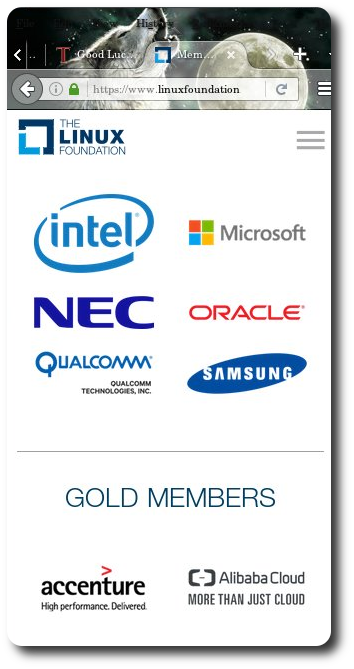

THE US patent office is no longer as lenient as it used to be, but software patents continue to be granted on occasions and troll lawsuits are still being filed (albeit fewer of them than before). As so many companies out there now use Android (Linux), the targets of litigation are often users/distributors of Android and hence "PAX" has some real/perceived necessity. We recently wrote two articles about PAX [1, 2] and Andrew Updegrove, who had worked for the Linux Foundation, wrote the following about it yesterday, under the headline "Google Announces Android “PAX” Cross-License Program – But to What Purpose?"
The first meaningful OSS defensive initiative was Open Source Development Labs (OSDL), founded back in 2000 by companies like IBM, Intel and HP to reassure developers and customers in the face of the veiled threats then being made by Microsoft against users of Linux and other OSS, and in light of the actual (and ultimately unsuccessful) litigation by SCO, perhaps bankrolled by Microsoft, against four companies using Linux.
[...]
Like OSDL, OIN was heavily funded by its founding members and has a high-powered Executive Director and staff. Over 2,000 organizations have now signed the OIN License Agreement, which you can read here, without having to send in a request to be vetted, or incurring a confidentiality obligation.
And then there are the many efforts that were far less meaningful. Beginning with an announcement by IBM on January 11, 2005, many of the leading IT companies made public “patent non-assertion pledges” to reassure users of Linux (and sometimes other prominent OSS programs) that they would not be sued. Those companies ultimately included Motorola, Nokia, Sun, Google, Oracle and others, each publicly releasing its own slightly different legal pledge, and its own specified list of patents - dozens, scores and even hundreds of them. In the case of IBM, the package included exactly 500 patents, an oddly round number. (The same press release also noted that IBM had filed more patents than anyone else for the fourth year in a row, conveying a rather mixed message to the patent-averse open source community.)
Procedural decisions relating to two major Apple cases have come down this week. With respect to design patent damages in Apple v. Samsung, Apple did not get its preferred way forward (affirmance of prior damages verdict and an immediate re-retrial necessitated by the Federal Circuit's dismissal of Apple's trade dress claims), but the United States Judicial Panel on Multidistrict Litigation has granted Apple's wish that its contract, patent and antitrust action against Qualcomm be kept separate from a long list of (consumer) antitrust cases related to the FTC's mid-January complaint against Qualcomm.
There isn't much to say right now about the Apple v. Samsung design patents case. In a case management order handed down on Tuesday, Judge Lucy Koh disagreed with Apple's most aggressive suggestions, which would have cut the remand proceedings short (after the Federal Circuit decided that the district court should take a closer look at the record in light of the December Supreme Court ruling). I'm not surprised and I doubt Apple itself was.